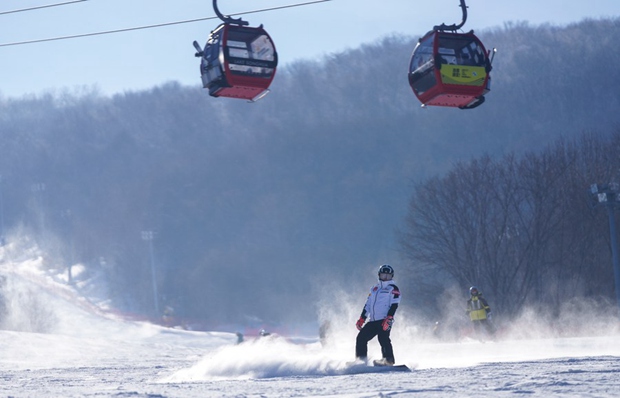During the Spring Festival, Wang Wei and his friends used to alternate between banquets and poker games for the reunion, but this year, they found a new activity -- skiing.
"It's more relaxing and healthy than drinking at the table as we can exercise and bond at the same time," said Wang, who lives in Linhe District in the city of Bayannur, north China's Inner Mongolia Autonomous Region.
Ice and snow activities have become a popular option for Chinese people during the Spring Festival holiday, which ran from Jan. 21 to 27 this year, thanks to increased public awareness of health and the availability of ice-and-snow facilities.
In the Duolanhu skiing field, where Wang visited, the number of daily visitors averaged over 800 since Jan. 22, the first day of the Chinese New Year. The figure rose more than 30 percent compared with the same period in previous years.
"Skiing enriches our entertainment. It is not only a sport but also a healthy lifestyle," said Li Yuan, who visited the field with his colleagues.
Over half of the visitors to the field are beginners, said Li Zhongqiang, general manager of the field, adding that the field has added new programs such as snow tubing and snow slides to attract more people.
"Now that there are more venues for ice-and-snow sports in our district, we are more active in participating in them," said Li Lei, a local resident.
The local government also launched an initiative with 24 enterprises to issue 100,000 coupons for ice-and-snow sports worth 10 million yuan (about 1.5 million U.S. dollars) to spur winter tourism.

A tourist skis at the Lake Songhua Resort in Jilin City, northeast China's Jilin Province, Jan. 30, 2023. (Xinhua/Yan Linyun)
Driven by the Beijing Winter Olympics and China's further relaxation of its COVID-19 travel restrictions, ice and snow tourism has gained steam among Chinese people looking for a different experience during the Spring Festival.
In northwest China's Xinjiang Uygur Autonomous Region, top-rated skiing resorts received around 121,800 people during the festival, up nearly 5 percent from the same period last year, while tourism revenue reached 19.96 million yuan, up 80.16 percent from last year, latest statistics showed.
The ice-and-snow programs in Xinjiang have become a hot option for Spring Festival travel, attracting tourists from across China while also boosting income for homestays, hotels, catering and entertainment industries, the regional cultural and tourism department noted.
In Guosong village in northeast China's Jilin Province, a traditional ice-and-snow tourism hotspot, neon billboards were lit up during the Spring Festival as night falls, promoting local cuisines to visitors looking for a bite after a long day of skiing.
The village is located only 1 km from a ski resort in Changbaishan Mountain, one of the top powder snow bases in the world. Once isolated in the mountains, the village is swarming with visitors thanks to the growing popularity of ice-and-snow tourism.
Official statistics show that the bookings of homestays around snow fields in Jilin during this year's Spring Festival holiday have increased by more than 16 times compared with 2019.
A report on China's snow and ice tourism development predicts that the number of snow and ice leisure travelers in China is expected to exceed 300 million in the 2022-2023 snow and ice season. The number is expected to reach 520 million in three years, and the related tourism revenue will reach 720 billion yuan.
During this year's Spring Festival, multiple cities including Beijing, Tianjin, and Harbin, capital of China's northernmost Heilongjiang Province, have launched a spate of activities surrounding the theme of ice and snow to promote consumption.
In the Harbin Ice-Snow World, China's largest ice and snow theme park, 150,000 cubic meters of ice and snow have been turned into hundreds of landscapes for people to enjoy, while a 500-meter-long ice slide becomes a major attraction.
At a restaurant on Harbin's bustling Zhongyang Street, over 70 percent of the customers during the festival are non-locals. "It's uplifting to see the lively restaurant," said Wang Xu, operating manager of the restaurant, "I believe Harbin's tourism market is seeing a full recovery."














